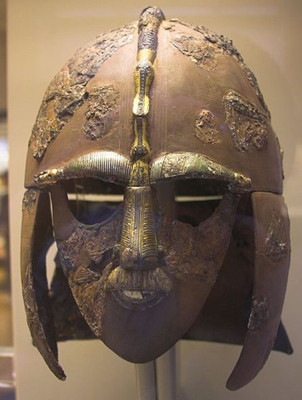And the ship is 27 metres long, so it's longer than the biggest of the ocean-going yachts. It's a really massive ship, it's the biggest, most complete Anglo-Saxon ship ever found."
船体长达27米,是已知最大最完整的盎格鲁-撒克逊时期的船只。
We're inland. Why would anybody here want to be buried in a ship?
我们身处的是内陆,那为何有人会希望被葬在船上?
"Ships were very important to these people. The rivers and the sea were their means of communication. It was much easier to go by water than it was by land at this time, so that people, say, in modern Swindon, would have been on the edge of the world to these people. Whereas people in Denmark and Holland would be close neighbours."
对当时的盎格魯撒克逊人来说,船只极为重要。河流与海洋是他们主要的交通路径。在那时,水路交通比陆路方便得多。因此,当时居住在现代斯温顿的人对他们来说无异于居住在世界尽头,而丹麦和荷兰则是他们的近邻。
And the big question of course - for anybody looking at the grave and what was found in the grave - is that there's no body.
当然最大的谜团—对任何人看着坟墓,坟墓中斯所发现的是没有尸体。
Where do you think the body is?
你觉得身体在哪里?
"Well, the absence of the body was a bit of a mystery when the excavation happened, and people wondered whether this could be a cenotaph - i.e. a burial where the body had been lost - so it's a sort of symbolic burial if you like. But nowadays we think a body was buried in the grave, but because of these special acidic conditions of this soil it just dissolved away. What you have to remember is that a ship is a water-tight vessel, and when you put it in the ground the water percolating through the soil builds up in it and it basically forms an acid bath in which all these organic things like the body and the leatherwork and the wood dissolve away, leaving nothing."
人们曾认为这可能是个衣冠冢,是无法得到逝者尸体时的一种象征性墓葬。但我们现在认为,它的确曾埋葬过逝者,只是当地特殊的酸性土壤分解了所有尸骸。你知道,船是不透水的,因而埋入地下之后,泥土中析出的水分逐渐汇聚其中,基本上形成了一个注 满酸性液体的浴缸。一切有机物如尸体、皮革、木头等都被溶解, 因而消失了。
We still don't know who that owner was, but the Sutton Hoo helmet put a face on an elusive past, a face that has ever since gazed sternly out from books, magazines and newspapers. It's become one of the iconic objects of Britain's history.
我们至今仍未了解这艘船的主人是谁。但萨顿胡头盔给了这段难以捉摸的历史一张面孔,一张自发现以后便不断出现在书籍、报纸和杂志上, 庄重地凝视着人们的面孔。它已成为英国史的代表性物品之一。



